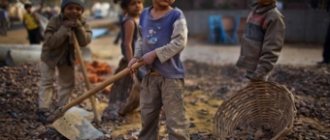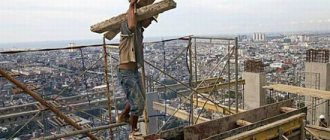Unfortunately, child labor is exploited quite often. They regularly try to involve my eight-year-old son in doing various kinds of work at school. The child is constantly on duty, as well as cleaning areas during school hours, and due to this, his academic performance is significantly reduced. As a caring father, I was extremely outraged by this situation, and I decided to consult with an experienced lawyer regarding the exploitation of child labor.
In this article I want to convey to other parents the information I learned from a professional. We will talk about what legislative acts regulate criminal liability for the use of child labor, as well as what types of liability await guilty individuals. We will also talk about involving children over fourteen years old in various types of work.
Child labour
According to current legislation, it is quite careful to involve a child in performing any work, since in some cases criminal liability is provided for actions of this kind. In addition, a ban on the exploitation of child labor is also imposed by such a source as the Russian Labor Code. This topic is also addressed in Federal Law No. 273, which deals with issues of education, and in the Convention on the Rights of the Child.
Based on these legislative acts, an individual who is under eighteen years of age has the right to independently decide whether to participate in a certain type of work. For example, if the school principal says that cleaning the area is a mandatory activity for all students, then in reality this is not the case. The child has every right to refuse and not take part in procedures of this kind.
I draw your attention to the fact that if a child did not want to do this or that work, but as a result he was forced, then the individual who forced him to do this will be punished.
Criminal liability
Article number 127.1, part of the current Criminal Code, states what penalties are imposed on criminals guilty of exploiting child slave labor. If an individual who has not reached the age of eighteen was forced to perform work of a slave nature, and he, in turn, was not able to refuse to perform it, then the second part of Article 127.1 comes into force.
As a punishment, the offender is expected to perform forced labor. You will need to work for them for a maximum of five years. Imprisonment of the convicted person for a term of three to ten years is also possible. In addition, the judge may additionally activate a ban on the offender from performing his main activity for fifteen years. This punishment is optional and can be approved or not (in addition to imprisonment).
It should be noted that a ban on carrying out an activity is imposed in cases where the convicted person tried to involve child labor in it.
In some situations, it happens that as a result of the use of child labor on a slave scale, the child’s health is seriously harmed or he even dies. In such cases, the third part of Article 127.1 comes into force, and criminals, in turn, face the most severe forms of criminal penalties.
The guilty individual is imprisoned. The minimum period during which this sanction is valid is eight years, and the maximum period for the validity of such a punishment is fifteen years. In addition, an individual may be restricted in freedom for an additional year.
The Criminal Code also contains the following legislative acts that address issues of child labor exploitation:
- Article 127. This act regulates the types of liability for criminals who unlawfully deprived an individual of his freedom, but this was not kidnapping. If the role of the victim was a minor individual, then the second part of the article comes into force. Punishments include forced labor for five years or imprisonment for a minimum of three years and a maximum of five years. If such deprivation of liberty caused death or serious harm to the health of the victim, then the person is deprived of liberty for 4-8 years.
- Article 127. This article is devoted to the issues of trafficking in minors for the purpose of subsequent exploitation of their labor (part two). The punishment is imprisonment for 3-10 years. Also, the offender may be banned from holding his position for another 15 years. Another additional sanction is a restriction of freedom for a two-year period.
Use of child labor from 14+ years
Current legislation establishes a minimum age at which individuals are allowed to be employed. This figure is fourteen years and was approved on the basis of Article 63 contained in the Labor Code. In addition, the law establishes that if a manager hires an individual between the ages of fourteen and eighteen, he is obliged to provide him with favorable working conditions. It is also strictly prohibited to involve a child in areas of activity associated with hazardous or harmful working conditions.
There are a number of provisions that must be complied with by the employer regarding the use of the labor of a minor employee. It is prohibited to assign jobs that involve physically demanding labor.
If the performance of a certain type of duties carries a high probability of injury of a work-related nature, then they are also not allowed to be established in relation to a minor. Article number 268 of the Labor Code determines that managers do not have the right to send employees who are children on business trips. The same legislative act, as well as articles number 96 and 99 of the Labor Code, determine that children should not work on weekends and night shifts.
In addition, the manager should not forget about the maximum period of time a working week can be for an employee aged 14-18 years. The length of the week for such workers is approved by Article 92 of the Labor Code. If an individual is between the ages of fourteen and sixteen years, then he can work in total no more than 24 hours a week.
If the employee is already sixteen years old, but has not yet reached the age of eighteen, then he is allowed to work 36 hours in one week. Also, if an employer wants to hire a child under the age of sixteen, then he should take into account that this procedure can be carried out only with the consent of the parents. In addition, you will need a similar document issued by the guardianship authorities.
Evidence part
The preliminary investigation bodies - the investigator or the interrogating officer - have the right to deal with issues of proving the existence of the occurrence of a particular crime. They are the ones who have the right to draw a conclusion about whether forced labor took place, whether it was committed against a minor, etc.
The use of illegal child labor can be used in various fields
In this situation, it is of particular importance whether the offender knew that the victim was under eighteen years of age. After all, often minor citizens look much older than they actually are.
If the fact that the offender did not know about the age of the victim is proven, his act should be regarded as involvement in slave labor under the first part of Article 127.2 of the Criminal Code of the Russian Federation.
Qualification criteria
The act called the use of slave labor provides for liability not only in relation to the commission of these actions to a minor, but also to other persons. Thus, according to the first part of the above article, responsibility is provided for attracting an adult citizen to work.
Next comes a tightening of responsibility. This occurs when a crime is committed against two or more persons, against a minor, with the use of violence, by an organized group, etc.
If all of the above acts resulted in the death of a person or any other serious consequences, the crime will be assessed more harshly.
Main conclusions
- Current legislation strictly prohibits such a procedure as the exploitation of child labor.
- In the Criminal Code, articles numbered 127, 127.2 and 127.1 are devoted to the illegal use of child labor.
- According to the articles of the Criminal Code of the Russian Federation on the exploitation of child labor, violators may face forced labor, restriction/deprivation of liberty, as well as some other penalties.
- If a manager hires an employee aged 14-18 years, then he is obliged to provide him with special, gentle working conditions.
Responsibility for child exploitation
The Criminal Code of the Russian Federation provides for several types of punishments
The criminal law provides for several types of punishments that can be applied to criminals. In relation to the above crime, the following applies:
- correctional work;
- deprivation of liberty;
- deprivation of the right to hold certain positions or engage in certain activities.
The latter punishment is relevant in situations where a citizen exploited children who were directly dependent on him (for example, a teacher).
Note! Correctional work consists of performing compulsory labor activities either at the previous or at a new place of work. There is a mandatory deduction from a citizen's salary.
In this situation, imprisonment is applied for a fairly long period - no more than ten years. Based on this, the act can be classified as serious. Therefore, the investigation of these crimes falls within the competence of investigators of the Investigative Committee of the Russian Federation.
Aggravating circumstances
The act will be punished more harshly in situations where the exploitation of the labor of minors resulted in serious harm or death. In this case, the term of imprisonment can reach fifteen years, which turns the act into a particularly serious one.
Peculiarities of labor activity of minors
Vagrancy of minors and involvement of a minor in vagrancy
The main document that defines the rights of a child is Law 124-FZ. Art. 11 establishes guarantees regarding payment and labor protection, provision of leave and shortened working hours for children over 15 years of age who want to work. The employment of minors is also regulated by the Employment Law No. 1032-1 and the Labor Code.
In Art. 63 Labor Code defines the requirements for hiring citizens under 18 years of age. As a general rule, you can enter into an employment contract at the age of 16. From the age of 15, the following categories of persons are allowed to be employed exclusively for light work that does not cause harm to health:
- graduated from secondary school;
- expelled from a general education institution and continuing to study in another form, and work activity should not interfere with their studies.
If a minor has not yet completed his studies, then work should not interfere with his education. Teenagers under 14 years of age are allowed to work only in theater, concert, cinema and circus organizations, as well as participate in sports competitions. The length of the working day in this case is agreed upon with the guardianship authorities.
Restrictions on the use of minor labor
✅ The right of secondary and higher educational institutions to attract students to work
Most often, students are involved in such types of work as:
- cleaning up debris and fallen leaves in the surrounding area;
- cleaning classroom floors;
- general cleaning of the school, washing floors and desks;
- carrying out excavation work: harvesting, weeding beds;
- summer practise;
- work in lieu of school hours;
- school duty.
A child can be involved in work with his voluntary consent and subject to one of the following conditions:
- The parents provided written consent to engage the child in labor. It must be drawn up in the form of a statement, agreement, or a condition regarding this must be stated in the agreement on the provision of educational services. It is worth considering that such agreements can be signed by both parents (or legal representatives of the child) and students themselves over 14 years of age according to the provisions of Art. 26 of the Civil Code.
- The representative body of the educational institution decided on the need to legalize the participation of children in duty or summer practice. This body includes not only representatives of the teaching staff, but also students and their parents. If the appropriate decision on duty or summer practice has been made, then all students and their parents are notified about this.
If parents and the administration of the educational institution have agreed that students can sometimes be involved in work, then the signed agreement should reflect the order, conditions and volume of work: for example, duty once a month and the amount of work that includes (watering flowers, washing floors, garbage removal, etc.). Otherwise, the school will have grounds to abuse the will of students to use their labor.
If the school has a voluntary consent to work, parents should monitor how fully it complies with sanitary and child labor protection standards. Thus, children cannot be involved in washing windows or lifting heavy objects, or performing work near railways or roads.
Is your child involved in cleaning or on duty at the school?
Yes, regularlyRarely, but sometimesNo
Explanation of technology lessons
As for labor training classes (this lesson is also called technology), additional consent from parents is not required. For example, as part of labor lessons, students can sew workwear for technical staff or repair school furniture - and this will be included in the educational program. Whereas all work outside the program must be entirely voluntary.
Attracting students to work
Not only schoolchildren, but also college and university students are attracted to work. If the corresponding obligation is in the curriculum, then periodically students will have to wash walls and sweep stairs or work as volunteers as part of various programs - for example, in election campaigns. On such days, students are excused from classes, and they must work instead of studying. In many universities, such voluntary-forced labor is called labor.
During the spread of coronavirus, students are often involved in volunteering: for example, they deliver medicine and food to people who are required to self-isolate. Often the student is simply presented with the fact that starting tomorrow he is a volunteer. Naturally, such actions are illegal: even the very definition of “volunteer” means “volunteer.” The State Duma decided to smooth out students’ dissatisfaction and proposed to count volunteering as part of their practical training.
With the agreement of the United Russia and the Ministry of Education, universities will be able to make a decision on whether volunteering is included in practical training, without waiting for the adoption of regulations.
Family. Types, legal statuses and measures of support from the state
Read
Rights, responsibilities and duties of a child in Russia. Protection of children under 18 years of age
More details
At what age and where can a child work without breaking the law?
Look







